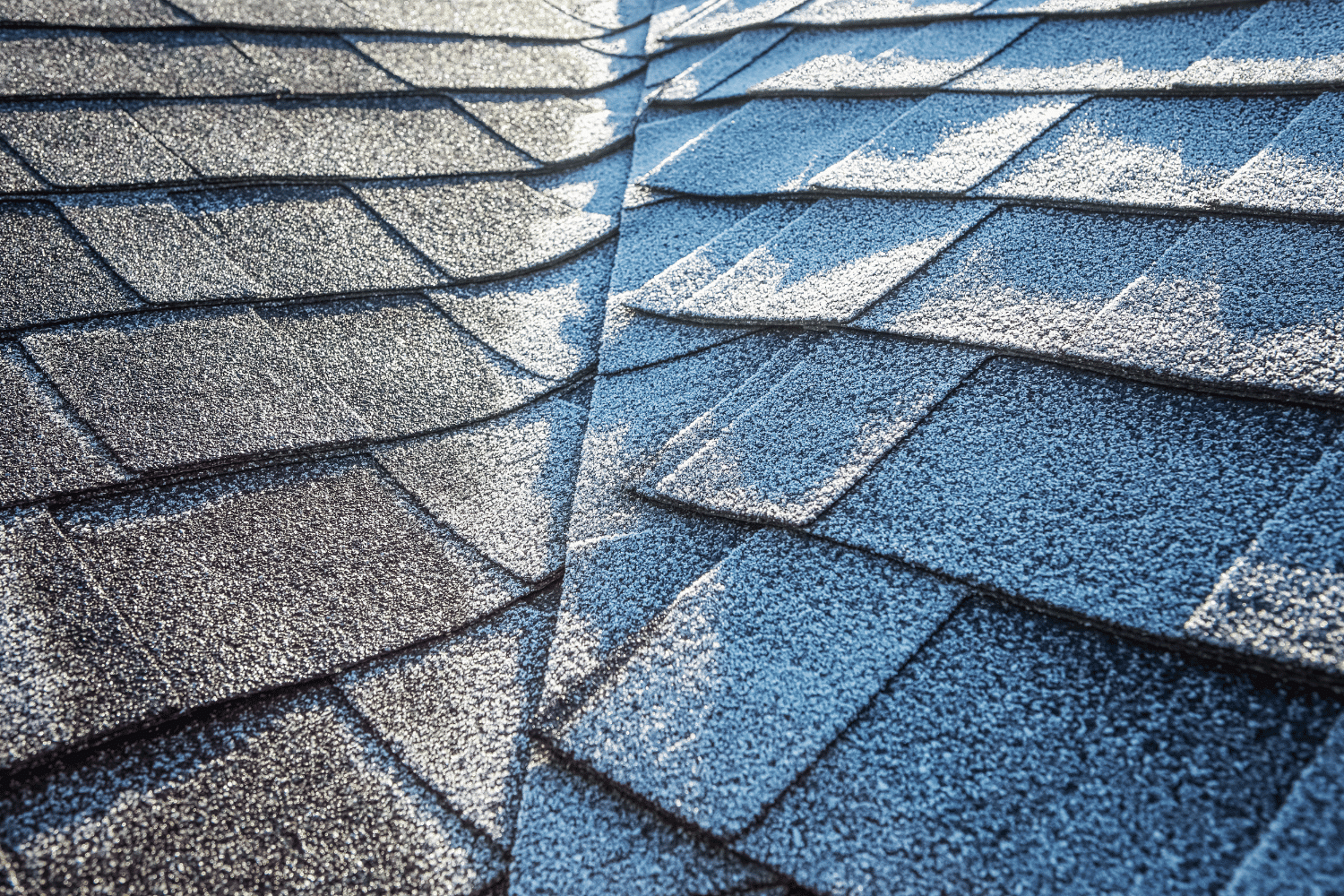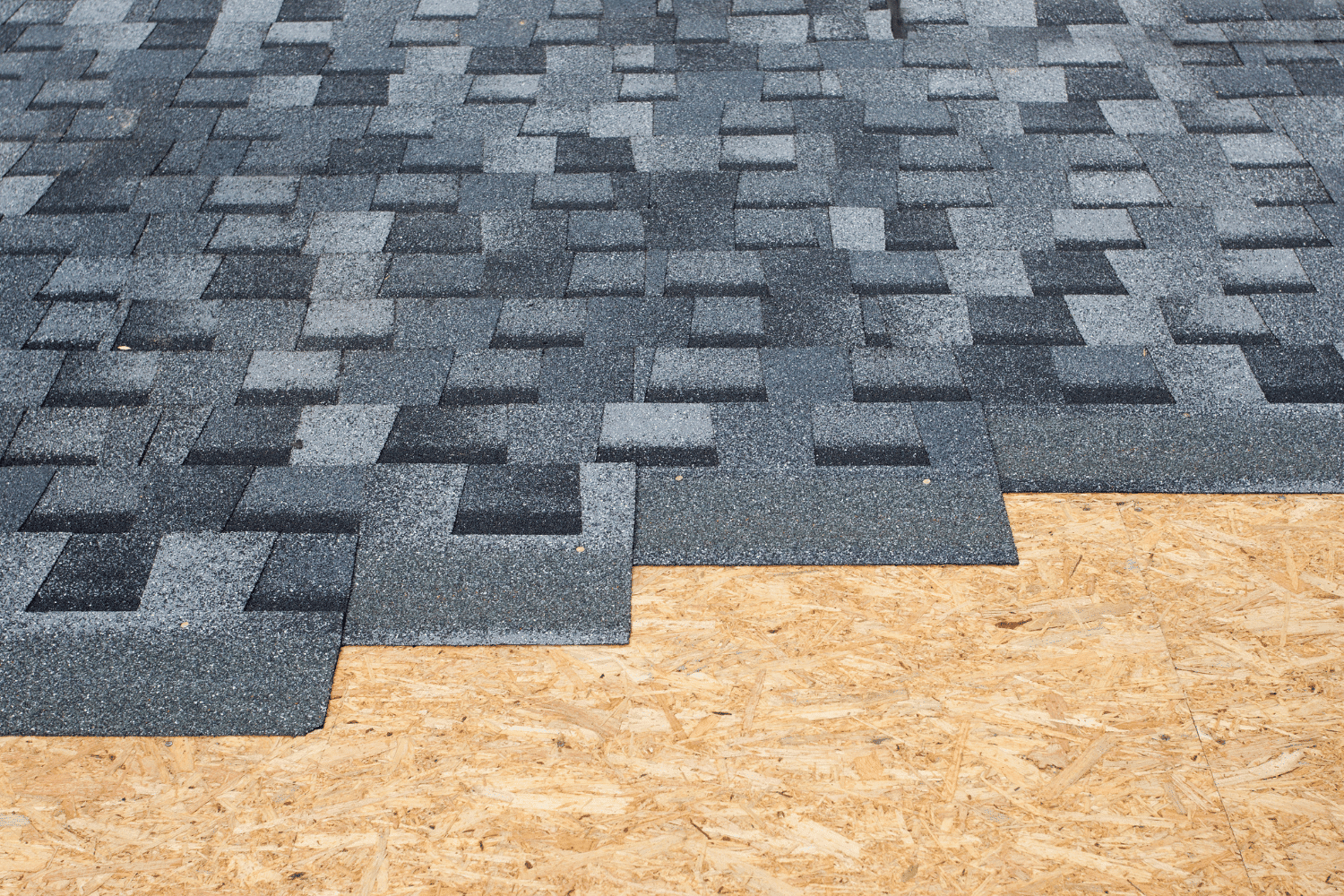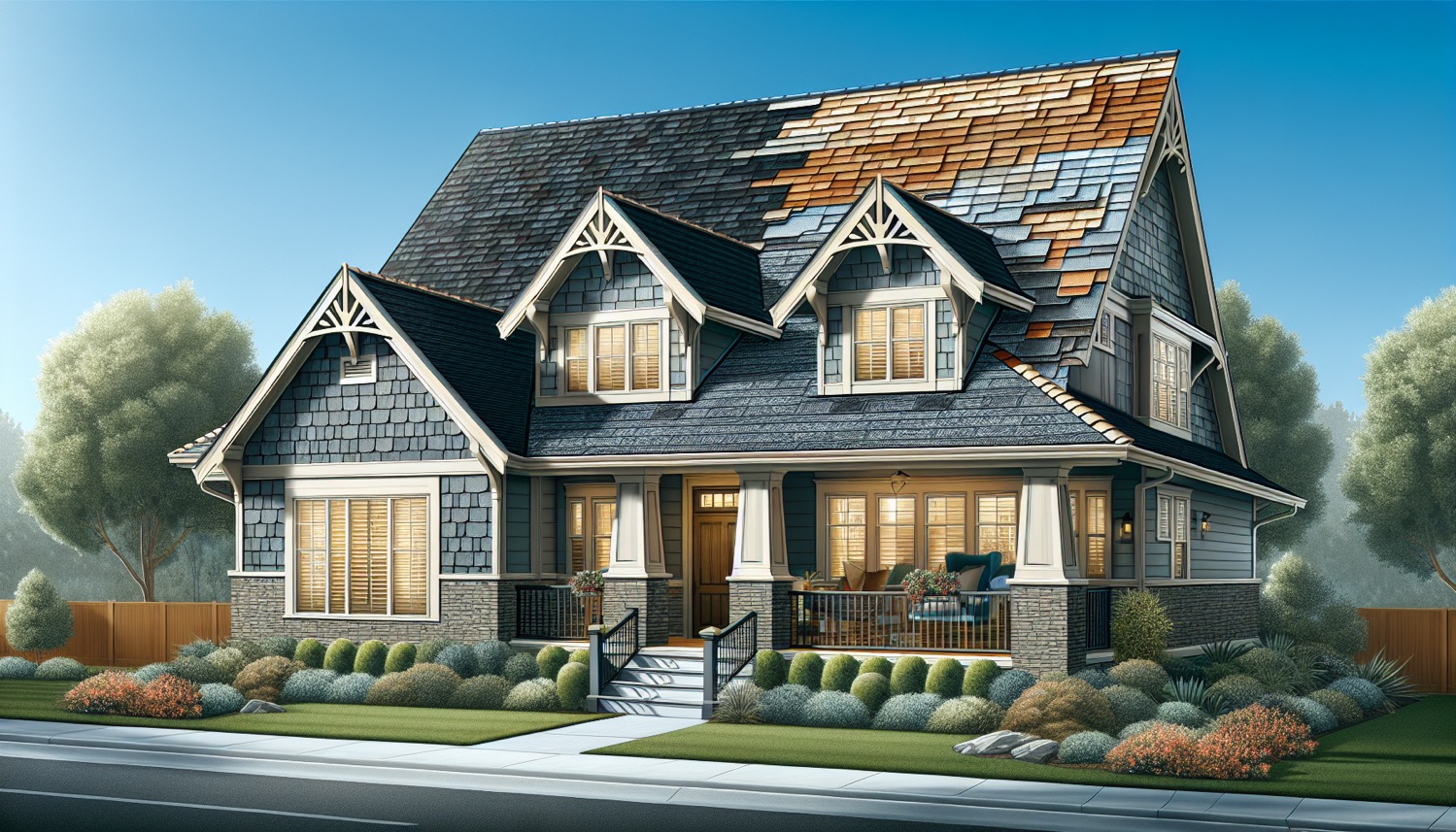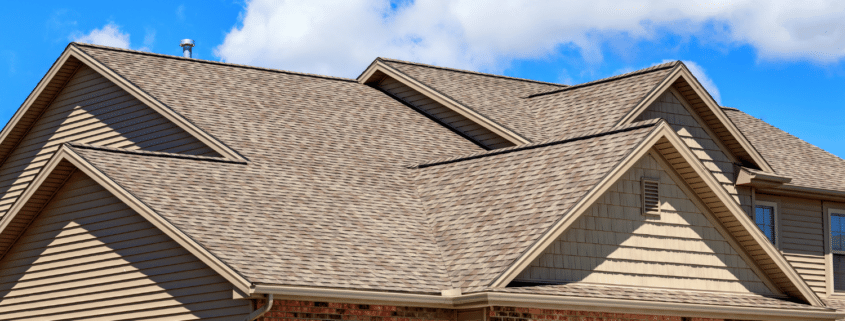Choosing the Best Roof: Composite Shingles vs. Asphalt Shingles
Composite shingles, made from recycled materials, offer the look of slate or cedar with added durability and low maintenance. This guide will explain their benefits and compare them to asphalt shingles.
Key Takeaways
-
Composite shingles offer superior durability, aesthetic flexibility, and eco-friendly benefits, making them a premium choice despite higher upfront costs.
-
Asphalt shingles are more affordable and easier to install but have a shorter lifespan and higher maintenance requirements compared to composite shingles.
-
Composite shingles have a longer lifespan (up to 50 years) and better weather resistance, providing long-term value for homeowners willing to invest in a high-quality roofing solution.
Understanding Composite Shingles

Composite shingles, also known as composite roofing, are an innovative and popular roofing material made from a blend of recycled plastic, rubber, synthetic polymers, asphalt, fiberglass, and even recycled paper. This unique composition allows them to emulate the look of natural materials like slate and cedar shakes using molds of these materials to achieve a remarkably authentic appearance. We were amazed by how closely these synthetic shingles resembled real slate tiles and cedar shakes, offering a high-end look without the associated maintenance issues.
Another standout feature of composite shingles is their durability. These shingles are designed to withstand significant impacts without cracking, making them an excellent choice for areas prone to hail and other severe weather conditions. Whether dealing with intense UV rays or heavy winds, composite shingles offer superior resilience, making them a reliable option for long-term roof protection.
Benefits of Composite Shingles

Composite shingles bring a host of benefits to the table, including unmatched durability, aesthetic flexibility, and environmental advantages. These shingles can withstand extreme weather conditions and last up to 50 years with proper maintenance. Their ability to mimic the appearance of natural materials like slate and cedar shake adds significant aesthetic appeal to any home. Additionally, being made from recycled materials such as rubber and plastic, composite shingles are an eco-friendly choice.
Now, we’ll explore these benefits in more detail.
Durability
Composite shingles impress with their ability to endure extreme weather conditions. They can handle wind speeds of 110 to 190 mph and heavy hail, thanks to their high impact rating (Class 4). This level of durability makes composite shingles a smart investment for homeowners looking to protect their property from harsh weather conditions.
In addition to their impact resistance, composite shingles offer several other benefits:
-
They are fire-resistant, with many holding a Class-A fire rating.
-
They are engineered to resist tearing and cracking, providing years of reliable service.
-
The protective coating on these shingles helps resist UV rays, preventing sun damage and ensuring the roof retains its integrity and appearance over time.
Aesthetic Appeal

Another reason homeowners are increasingly choosing composite shingles is their aesthetic appeal. Available in a wide variety of colors and styles, these shingles can closely mimic the look of natural materials like slate and cedar shake. We were particularly impressed by the realistic grain patterns and deep grooves found in composite cedar shake shingles, which closely resemble real wood shakes. This flexibility allows homeowners to achieve a high-end look that enhances their home’s curb appeal.
Offering more style options than traditional asphalt shingles, composite versions cater to a wide range of aesthetic preferences. Whether you’re drawn to the classic look of slate roofs or the rustic charm of a wood shake roof, there’s a composite shingle for you. The use of molds from real slate tiles and cedar shakes ensures an authentic appearance that can significantly boost the visual attractiveness of your home.
Environmental Impact
For modern homeowners who prioritize environmental sustainability, composite shingles are an excellent choice. Made from a blend of synthetic polymers and recycled materials, these shingles contribute to environmental conservation. By using recycled rubber and plastic, these shingles help reduce waste and the environmental footprint associated with roofing materials.
Moreover, the long lifespan of composite shingles means fewer roof replacements and less waste over time. This durability coupled with their eco-friendly composition makes composite shingles a responsible choice for homeowners who are conscious of their environmental impact. Choosing composite shingles is a step towards a more sustainable future, without compromising on quality or aesthetics.
Cost Analysis of Composite Shingles

Any roofing decision must take cost into account, so it’s crucial to understand the financial implications of choosing composite shingles. While composite shingles can be more expensive upfront, they offer long-term savings due to their durability and low maintenance requirements. For a comprehensive understanding, let’s analyze the costs in terms of material, installation, and maintenance.
Material Costs
Composite shingles are generally more expensive than asphalt shingles, with material costs ranging between $100 to $1,500 per square, depending on the type and durability. This price range is significantly higher than that of asphalt shingles, which typically cost between $80 to $100 per square. For a 1,700-square-foot roof, the material cost alone for composite shingles can range from $10,880 to $16,320.
Despite the higher cost, the superior quality and longevity of composite shingles make them a worthwhile investment. These shingles offer a premium look and enhanced durability, which translates into long-term value for homeowners. While the initial investment is steep, the extended lifespan and reduced need for replacements make composite shingles a cost-effective option in the long run.
Installation Costs
Installation costs for composite shingles are also higher compared to asphalt shingles. This is mainly due to the complexity of installing composite shingles, which often requires more skilled labor. Typically, labor accounts for about 60% of the total installation cost. For instance, if the total cost of a composite plastic roof installation is $14 per square foot, approximately $8.40 per square foot would go towards labor.
In contrast, asphalt shingles have several advantages:
-
They are easier and faster to install, leading to lower labor costs.
-
The average cost for roof installation labor for asphalt shingles is around $2 per square foot.
-
This price difference can make asphalt shingles a more attractive option for homeowners on a tight budget.
Maintenance Costs
One of the key advantages of composite shingles is their low maintenance requirement. These shingles are designed to withstand harsh weather conditions and resist mold, mildew, and algae growth, reducing the need for frequent repairs or cleanings. Homeowners can maintain their composite roofs by simply clearing debris, inspecting for damage after storms, and keeping gutters clean.
In contrast, asphalt shingles require more maintenance, particularly in humid climates where mildew and algae growth are common issues. The cost of professional cleaning for asphalt shingles can range from $0.30 to $0.60 per square foot. This maintenance should ideally be carried out every three to five years. Over time, these maintenance costs can add up, making composite shingles a more cost-effective option despite their higher initial price.
Comparing Composite Shingles to Asphalt Shingles
Several factors come into consideration when deciding between composite shingles and asphalt shingles. These include lifespan, initial cost versus long-term investment, and curb appeal. By comparing these aspects, homeowners can make an informed decision that best suits their needs and preferences.
Lifespan
Composite shingles have a significantly longer lifespan compared to asphalt shingles. Some benefits of composite shingles include:
-
Potential to last up to 50 years with regular maintenance
-
High-end versions often come with a lifetime limited material warranty
-
Provides long-term value and peace of mind for homeowners
On the other hand, asphalt shingles generally have a lifespan of about 20 years, with architectural asphalt shingles extending up to 30 years. While this is sufficient for many homeowners, those looking for a more durable and long-lasting solution may find architectural shingles or composite shingles to be the better investment.
Initial Cost vs. Long-Term Investment
The initial cost of composite shingles is higher than that of asphalt shingles, often making them a more substantial upfront investment. However, this higher cost is offset by the shingles’ long lifespan and minimal maintenance requirements. Homeowners who plan to stay in their homes for a long time will find that the durability and low maintenance of composite shingles result in significant long-term savings.
When considering asphalt shingles vs composite for your roofing needs, it’s important to note that asphalt shingles, while cheaper initially, may incur higher costs over time due to more frequent replacements and maintenance. For those on a tighter budget or planning to move in the near future, asphalt shingles might be a more practical choice. However, the long-term value of composite shingles cannot be overlooked.
Curb Appeal

Curb appeal is a vital consideration for homeowners looking to enhance their home’s visual attractiveness. Some reasons why composite shingles offer superior curb appeal are:
-
They can mimic premium roofing materials like slate and cedar shakes
-
They provide a high-end look that can significantly boost a home’s value
-
They make a home stand out in the neighborhood
While asphalt shingles are available in various colors and styles, they generally do not offer the same level of aesthetic flexibility as composite shingles. For homeowners looking to create a distinct and attractive roof, luxury asphalt shingles provide more options and a higher-end appearance.
Weather Resistance and Performance
Both composite and asphalt shingles offer good weather resistance, but composite shingles have a slight edge in extreme conditions. Composite shingles have a high impact rating, making them durable enough to withstand hailstorms and severe winds. They can handle wind speeds ranging from 110 to 190 mph, providing excellent protection against hurricanes and other extreme weather events.
Additionally, composite roof shingles fare better against UV rays, thanks to their protective coating that prevents sun damage like fading and cracking. This UV resistance helps maintain the roof’s appearance and structural integrity over time.
While asphalt shingles also offer good weather resistance, asphalt roofs are more prone to cracking in extreme cold and may not last as long under intense sun exposure as an asphalt shingle would.
Making the Right Choice for Your Home
When deciding between composite and asphalt shingles, you must consider factors such as budget, lifespan expectations, and aesthetic preferences. For those with a higher budget and a desire for a long-lasting, low-maintenance roof, composite shingles are an excellent choice. Their higher initial cost is justified by their durability, aesthetic appeal, and environmental benefits.
When considering roofing options, the debate of asphalt shingles vs other materials often arises. On the other hand, asphalt shingles offer a more affordable option with a traditional appearance that appeals to many homeowners. They are easier to install and maintain, making them a practical choice for those with budget constraints or shorter-term housing plans. Ultimately, the decision should be based on individual needs and priorities.
Working with a Professional Roofer
Partnering with a professional roofer guarantees:
-
A top-quality installation
-
The best performance from your chosen roofing material
-
Expertise and experience, ensuring that the roof is installed correctly and meets all safety standards
Consulting reputable roofing services can help guide your choice and provide peace of mind knowing your roof is in capable hands.
Manufacturer-certified contractors, like GAF-certified roofers, offer robust warranty options on both labor and materials, providing long-term protection and value. By working with a professional, you can ensure that your investment in composite or asphalt shingles pays off in the form of a durable, aesthetically pleasing, and high-performing roof.
Summary
In summary, both composite and asphalt shingles offer unique benefits and come with their own set of considerations. Composite shingles provide superior durability, aesthetic appeal, and environmental benefits, making them a worthwhile long-term investment despite their higher initial cost. Asphalt shingles, on the other hand, offer affordability and ease of installation, making them a practical choice for many homeowners.
Ultimately, the right choice depends on your specific needs, budget, and long-term plans for your home. By understanding the differences and weighing the pros and cons of each option, you can make an informed decision that enhances your home’s value and longevity.
Frequently Asked Questions
How long do composite shingles last compared to asphalt shingles?
Composite shingles can last up to 50 years with proper maintenance, compared to asphalt shingles that typically last around 20 years, with architectural asphalt shingles extending up to 30 years.
Are composite shingles more expensive than asphalt shingles?
Yes, composite shingles are generally more expensive than asphalt shingles, but they provide long-term savings due to their durability and low maintenance.
Do composite shingles offer better weather resistance than asphalt shingles?
Yes, composite shingles offer better weather resistance than asphalt shingles due to their higher impact rating, superior UV resistance, and ability to withstand extreme weather conditions like hail and high winds.
What are the environmental benefits of composite shingles?
Composite shingles offer environmental benefits such as being made from recycled materials like rubber and plastic, resulting in less waste and fewer roof replacements in the long run. This makes them an eco-friendly choice for your roofing needs.
Why should I hire a professional roofer for installing composite shingles?
You should hire a professional roofer for installing composite shingles to ensure high-quality installation, optimal performance, and adherence to safety standards, as well as to benefit from robust warranties and expert advice for long-term protection and value for your roof.


 Residential Roofing
Residential Roofing Storm Damage
Storm Damage Multi-Family Homes
Multi-Family Homes
